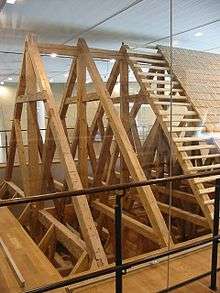Gwoździec Synagogue
_1940.jpg)

The Synagogue in Gwoździec (Ukrainian: Гвіздець - Hvizdets) located in the Kolomyia Raion, Ivano-Frankivsk Oblast, was erected in about 1640 under the Polish-Lithuanian Commonwealth, damaged during the First World War in consequence of the Pogrom caused by Tsarist troops and eventually burnt down after 1941 by German occupation forces.[1]
This nearly forgotten monument of Jewish culture was recalled in 2014 on the occasion of the reconstruction of the wooden vault in the POLIN Museum of the History of Polish Jews in Warsaw.
Description
The around 15 meters high building was erected on a rectangular floor plan with cut-off vertices. The walls were built as a log-and-pillar structure. The stepped hip roof was covered with wood shingles.
Below the rafter framing was an octagonal wooden vault suspended, around 11,3 × 11,3 meters wide, with rich polychromy decoration.
History
The vault was 1729 rebuilt, a vestibule, a women porch and a Cheder with brick walls added. Before 1910 the building was generally renovated, but during the first world war was damaged and 1918-1939 again renovated, but burnt down after 1941 by German occupation forces.
The polychromic decoration, executed after 1652 by Israel, son of Mordechai Lisnicki from Staryiy Yarychiv and renovated by Isaac, son of Yehuda-ha-Kohen from Yarychiv.
Reconstruction
The reconstruction of the vault, performed 2010-2014 for the POLIN Museum of the History of Polish Jews in Warsaw was possible thanks to the manuscript of the Polish painter Karol Zyndram Maszkowski (1868-1938). Maszkowski visited Gwoździec on the autumn 1891 to investigate the polychromy of the synagogue. On the order of the Polish Academy of Learning in Cracow he added 1898/1899 a set of drawings, showing the vault polychromy.

The reconstruction was made on the initiative of the Jewish Historical Institute in Warsaw in co-operation with the Handshouse Studio from Massachusetts.[2]
The reconstruction works were performed using traditional tools and materials and sponsored mainly by Mrs. Irena Platke. The carpenters works were made on the area of the Rural Architecture Museum of Sanok (Poland), the paintings in many locations in Poland and in the United States with the participation of students of artistic colleges.
Besides the synagogue vault, the rich decorated bimah on the center of the room was also reconstructed. The reconstruction was the topic of a 2015 documentary film titled Raise the Roof.[3]
In 2006, also in collaboration with Handshouse Studio and Thomas Hubka, students at Bowling Green State University created a 3D virtual model of the synagogue, seen in this fly-through movie. The model is to scale but lacks the interior wall paintings.
Coordinates: 48°34′46″N 25°17′1″E / 48.57944°N 25.28361°E
| Wikimedia Commons has media related to Gwoździec Synagogue. |
References
- Maria i Kazimierz Piechotkowie: Bramy nieba : bożnice drewniane na ziemiach dawnej Rzeczypospolitej : Instytut Sztuki PAN : Warszawa : Wydaw. Krupski i S-ka, cop. 1996 : ISBN 8386117028
- ↑ Shabbat Goy
- ↑ Thomas Hubka & Gwoździec synagogue
- ↑ "Raise the Roof". The National Center for Jewish Film. Retrieved 2 January 2016.